As the heart of the home, the living room and kitchen have long served as gathering places, where family and friends come together to share stories, laughter, and meals. In recent years, the conventional boundaries separating these two vital spaces have started to blur, giving rise to the popular trend of open concept living. Central to this design evolution is the kitchen island—an inviting centerpiece that not only enhances functionality but also fosters connection. Embracing togetherness through open concept living invites a harmonious flow of energy and interaction, transforming everyday tasks into shared experiences. In this article, we will explore the allure of open concept living room-kitchen islands, examining how they redefine our understanding of space, enhance our social dynamics, and ultimately, enrich our lives. Join us as we delve into the myriad benefits, design inspirations, and thoughtful considerations that come with this modern approach to home design.
Embracing the Flow of Connection in Open Concept Spaces
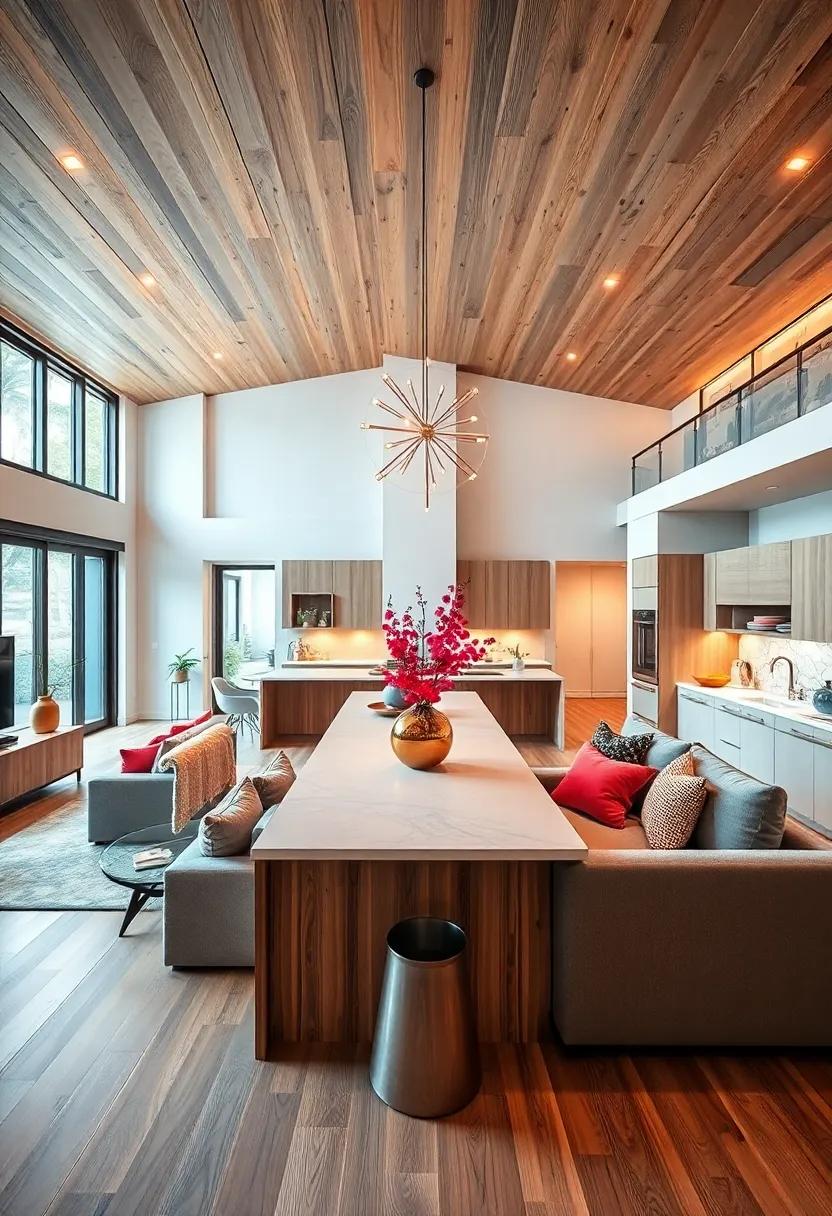
In open concept living spaces, the seamless integration of the kitchen and living room fosters a sense of togetherness that traditional layouts frequently enough lack. Imagine the vibrant energy that fills the room as friends gather around the kitchen island, sharing laughter and stories while appetizing aromas waft from the stovetop. This design invites social interaction, making it easier for hosts to engage with guests while preparing meals. The fluidity of movement enhances connectivity, transforming everyday tasks into shared experiences that strengthen relationships.
- Encourages interaction between family members
- Eliminates the feeling of isolation
- Creates a cozy atmosphere for gatherings
- Enhances the flow of natural light
Moreover, the aesthetic appeal of open concept spaces contributes to their allure. By incorporating a multi-functional kitchen island, homeowners can create an inviting centerpiece that serves various purposes—from cooking and dining to casual entertaining. This practical centerpiece can be complemented by strategically placed lighting and comfortable seating, ensuring that every corner of the space feels welcoming. below is a simple representation of how different elements can unify the open space:
| Element | Function |
|---|---|
| Kitchen Island | Cooking & Casual Dining |
| Seating Area | Social Interaction |
| Lighting Fixtures | Ambiance & Task Lighting |
The Warmth of Togetherness Created by Shared Living Areas
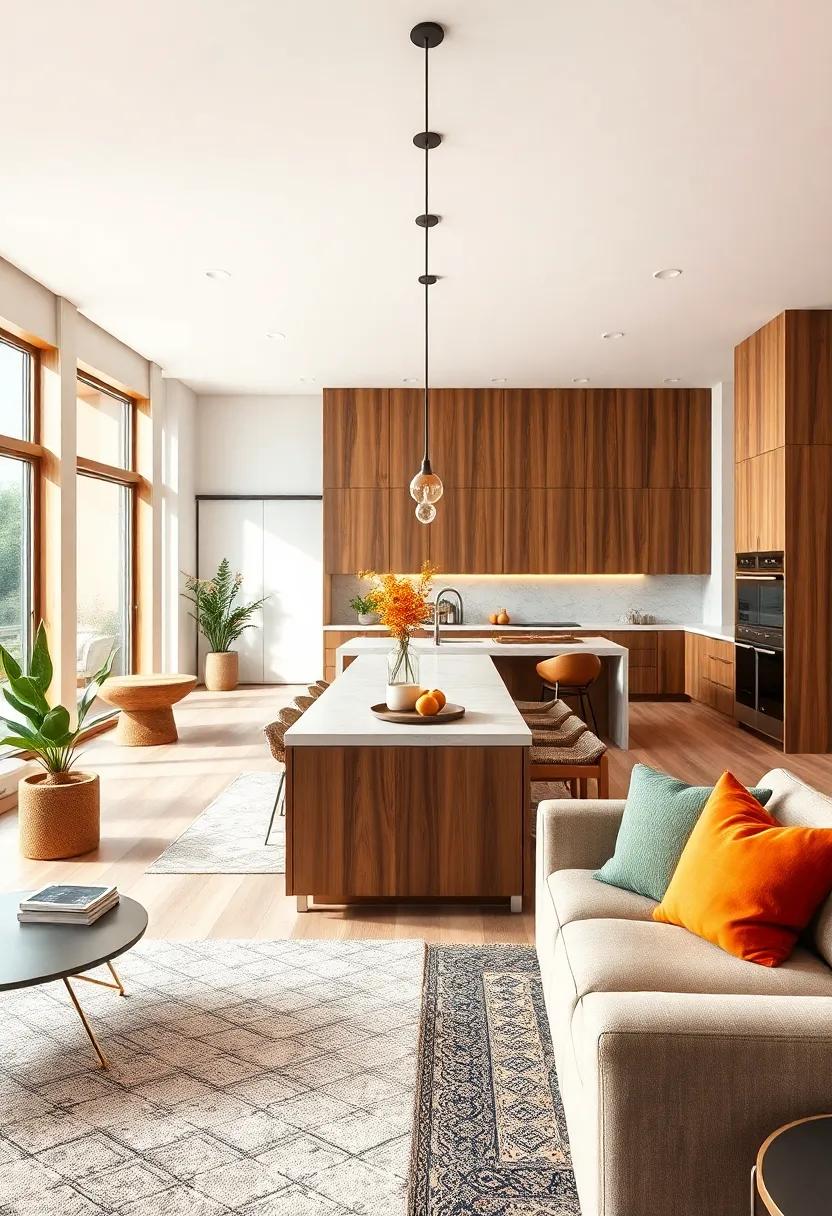
The essence of shared living areas lies in their ability to foster connections, turning everyday moments into cherished memories. When families and friends gather in these expansive spaces, the boundaries of routine blur, inviting laughter and conversation to flow freely. The open layout not only enhances the natural light but also encourages spontaneous interactions, transforming meal preparations into collaborative experiences. Imagine the aroma of a home-cooked dinner wafting through the air as loved ones gather around an island, chopping vegetables, sharing stories, or simply enjoying a glass of wine together.
In such settings, togetherness becomes a tangible presence, making it easy to offer assistance or share a joke while simultaneously preparing a feast. The design encourages a grouping of activities—cooking, dining, and entertaining—allowing individuals to slip in and out of conversations with ease. furthermore, the inviting nature of an open concept can facilitate gatherings of all sizes, whether it’s an intimate family dinner or a lively party with friends. This seamless flow between kitchen and living space cultivates an environment where connections can deepen, and nostalgia is created, all rooted in the warmth of shared experiences.
Seamless Integration: Where the Kitchen Meets the Living Room
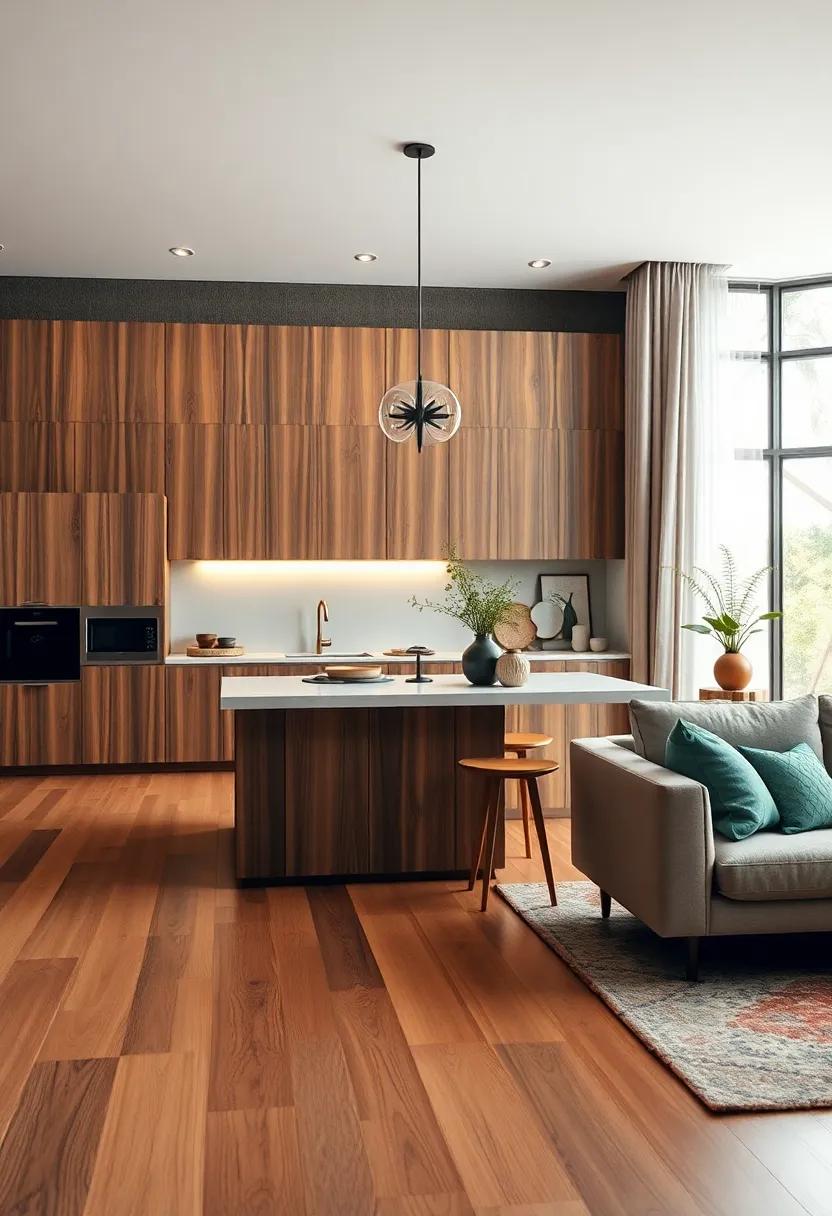
In modern home design, the line between the kitchen and living room has become delightfully blurred, creating an inviting space that fosters connection and interaction. The open-concept approach allows for a natural flow between functions, making it easy to entertain guests or keep an eye on children while preparing a meal. central to this integration are kitchen islands, which serve as multifunctional hubs where culinary creativity meets social engagement. Whether it’s a family gathering or a casual brunch with friends, the kitchen island transforms into a stylish dining area, a workspace for meal prep, or even a casual bar where everyone can relax and unwind.
Moreover, the visual appeal of combining these two spaces can be enhanced with thoughtful design elements.A curated selection of materials and colors can create harmony, with options such as:
- contrasting cabinetry that ties in with living room furnishings
- Integrated lighting that sets a warm atmosphere
- Open shelving for display and storage that mirrors the decor style
This blended living environment not only promotes togetherness but also elevates the overall aesthetic of the home, offering a cozy yet sophisticated atmosphere for daily living.
Choosing the Right Color Palette for Harmonious Spaces
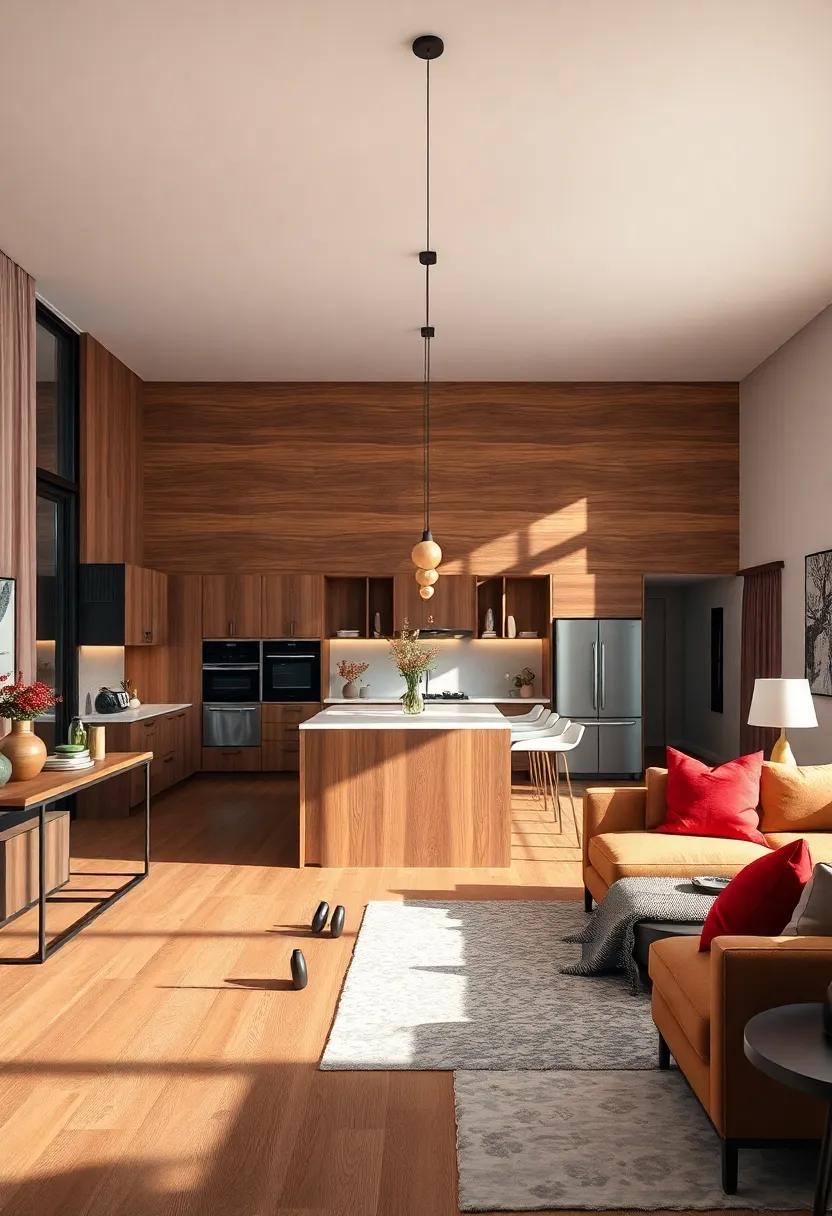
When designing a space that merges yoru living room with a kitchen island,the choice of color palette plays a crucial role in fostering a cohesive environment. Soft pastels can instill a sense of tranquility,making your shared spaces feel inviting and serene. Neutral tones, like beige and taupe, provide a warm backdrop that allows for bolder accents, such as vibrant fruits or artwork, to shine without overwhelming the senses. Consider these combinations:
- Pastel Blues and Creams: Evokes calmness and unity.
- Earthy greens with Warm Woods: Brings a touch of nature indoors, promoting a fresh vibe.
- Rich Jewel Tones paired with Soft Grays: offers depth and sophistication while maintaining approachability.
Additionally, balance is achieved through the use of complementary colors across both spaces. As a notable example, if your kitchen island features sapphire blue, you might tie the living area together with cushions or artwork in soft yellows or creamy whites. Incorporating a color wheel can guide your choices, ensuring you blend hues seamlessly. Here’s a simple reference to visualize contrasting yet harmonious combinations:
| Primary Color | Complementary Color |
|---|---|
| Soft Coral | Taupe |
| Muted lavender | Oatmeal |
| Sunset Orange | Dove Gray |
The Versatility of Kitchen Islands as Social Hubs
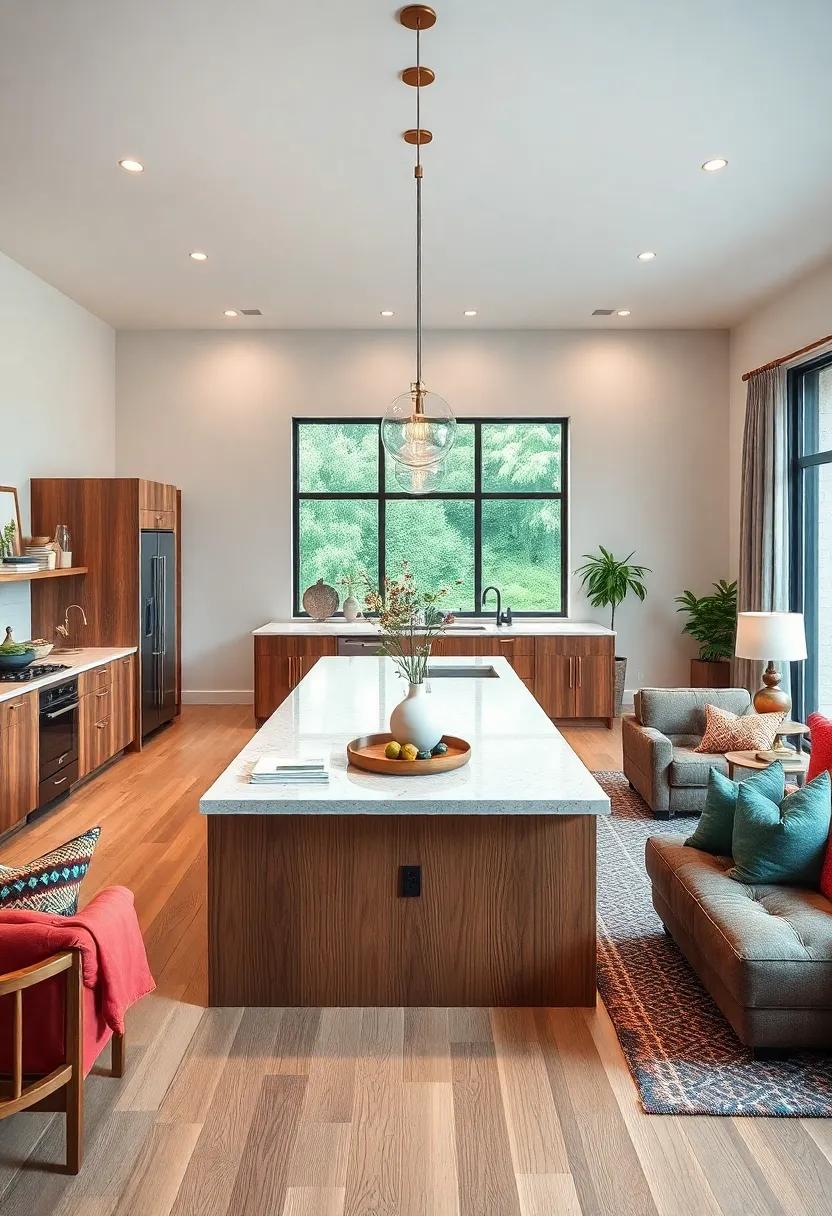
In modern homes, kitchen islands have transcended their utilitarian origins, emerging as dynamic social hubs that enhance the communal experience. They serve not only as additional workspace but also as a gathering point, where memories are crafted over shared meals and lively conversations. Imagine friends leaning against the counter, enjoying casual cocktails or morning coffee, while remnants of a family dinner linger in the air. The flexibility of these islands fosters a welcoming environment that encourages interaction, bridging the gap between cooking and socializing. The addition of bar stools transforms the space into an informal dining area, inviting guests to join in the process rather than waiting in solitude.
Furthermore,kitchen islands can accommodate a range of activities,adapting seamlessly to the rhythms of modern life. Whether you need a spot for children to do homework while dinner is prepared, a surface for hosting game nights, or a place for culinary innovation during weekend gatherings, the island responds to a variety of needs. Consider the key features that enhance their versatility:
- Multifunctional Design: Many islands come with integrated appliances like wine coolers or built-in stovetops.
- Varied Heights: Different levels create distinct zones for working, eating, and standing.
- Storage Solutions: Ample cabinets and drawers keep essentials within easy reach.
Realizing the potential of kitchen islands as connective spaces not only enhances the aesthetic appeal of the kitchen but also emphasizes the importance of togetherness in daily life. With the right design elements, they can transform a simple area into the heart of the home, fostering deeper relationships while cooking, eating, and sharing stories.
Maximizing Natural Light in Open Concept Living Areas
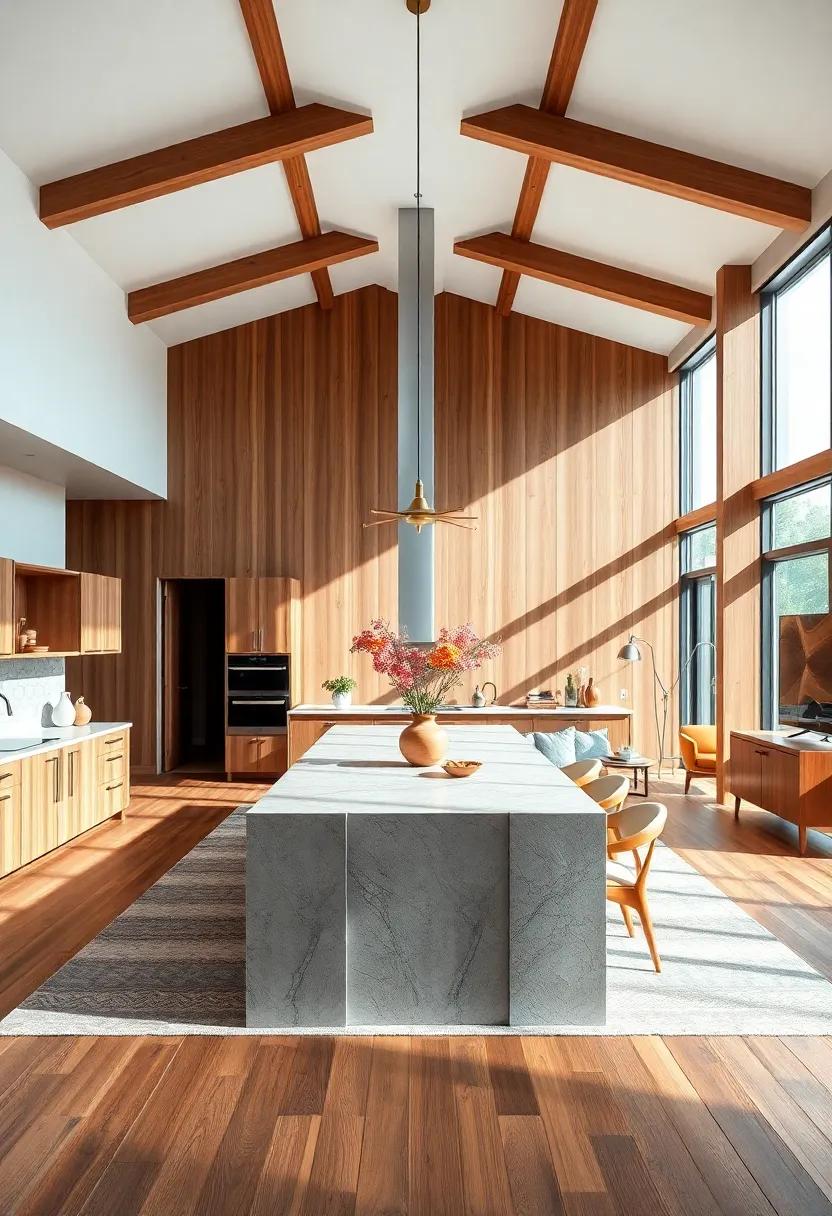
to create a radiant and airy ambiance in open concept living areas, strategically placing mirrors can dramatically enhance natural light. opt for larger mirrors to reflect light from windows and bounce it throughout the space, making the area feel more expansive. Additionally, consider using glass decor elements like vases or tabletops, as these can further amplify light without obstructing visibility. Incorporating light-colored furnishings also plays a vital role; shades such as soft whites, pastels, or light grays can work wonders in brightening up the area, allowing sunlight to permeate without interruption.
Another effective way to maximize natural light involves selecting appropriate window treatments. Sheer curtains or blinds that can be fully drawn back ensure that once the sun rises, your space is flooded with warmth and light. When designing your living area, consider the arrangement of seating and othre furniture to avoid blocking light sources. below is a table showcasing the best materials and colors for maximizing light:
| Material/Color | Benefits |
|---|---|
| Glass | Reflects light, creates openness |
| Light Wood | Warmth without heaviness |
| Soft White | Brightens space, enhances light |
| Pastels | Softly reflects light, creates calm |
Designing for Interaction: Furniture Arrangements that Flow
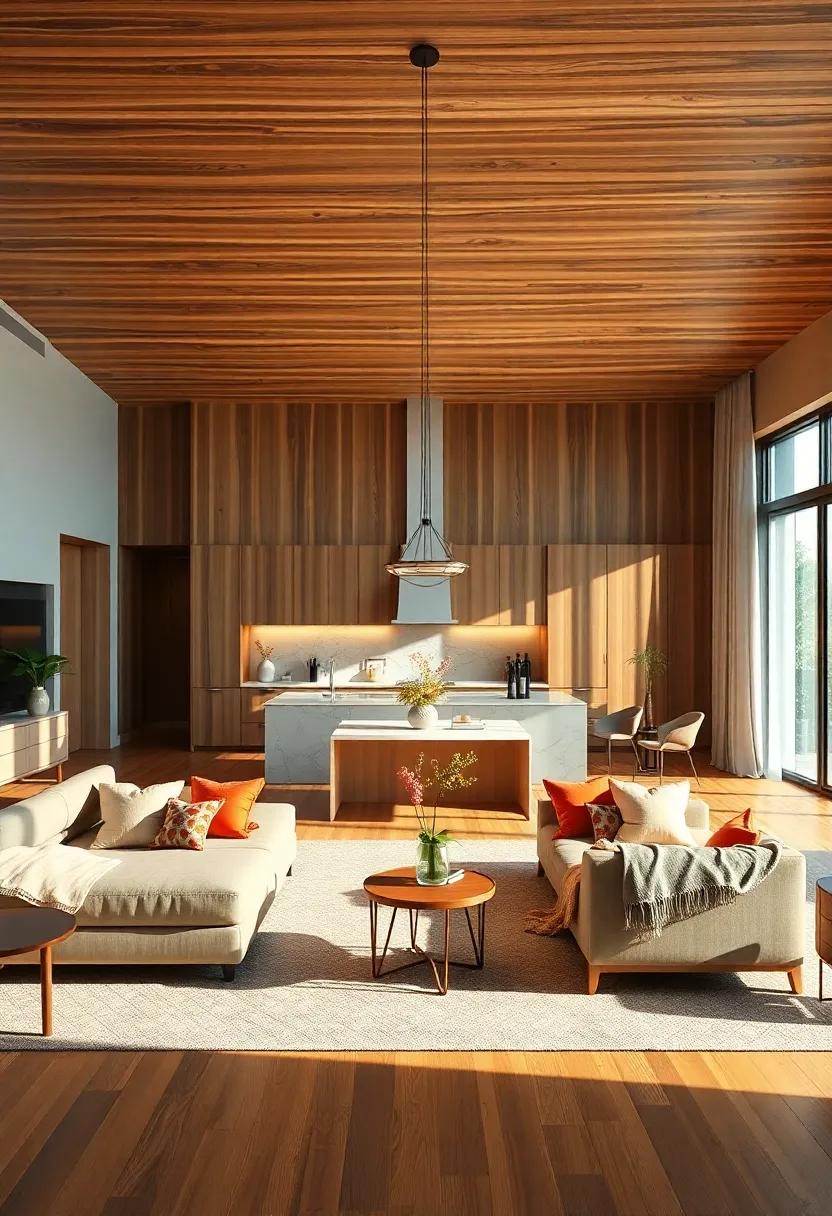
The arrangement of furniture in an open concept living space can significantly enhance interaction and create a welcoming atmosphere. By strategically positioning seating areas and kitchen islands, homeowners can cultivate an inviting environment conducive to conversation and togetherness. Consider the following elements when designing your layout:
- Flexible Seating: Utilize movable chairs and ottomans to accommodate different group sizes and activities.
- Defined Zones: Use rugs or furniture placement to subtly define distinct areas, such as dining, lounging, and cooking spaces.
- Direct Sightlines: Arrange furniture so that sightlines between the kitchen and living areas are clear, facilitating easy interaction.
Incorporating kitchen islands into the mix offers both functional and aesthetic benefits. These versatile pieces serve as social hubs where family and friends can gather while meals are being prepared. Below is a simple comparison of ideal kitchen island features that enhance flow:
| Feature | Benefit |
|---|---|
| Bar Seating | Encourages casual dining and conversation. |
| Open Storage | Makes essentials accessible, reducing clutter. |
| Integrated Appliances | Enhances functionality while maintaining an inviting look. |
Creating Zones: Defining Spaces Without Barriers
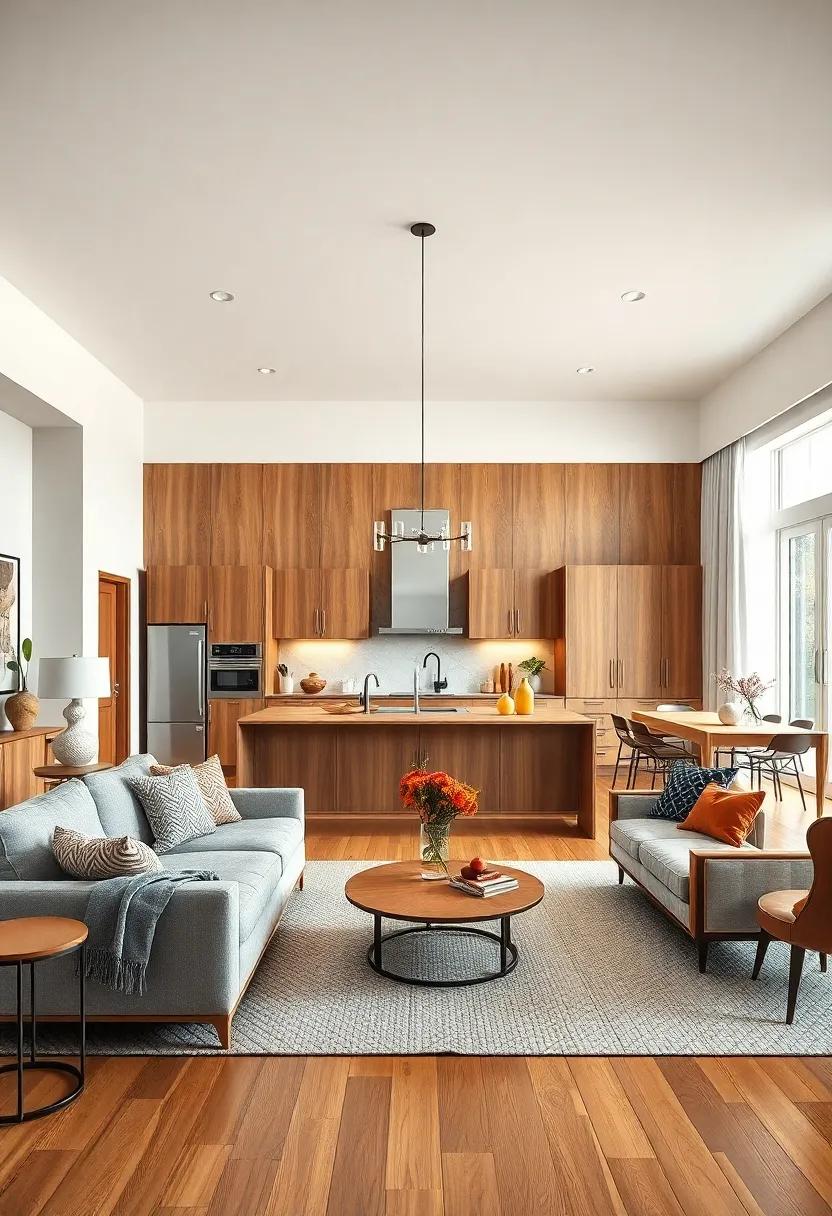
In the realm of modern design, the concept of open spaces encourages a flow that both welcomes and entices connectivity. By integrating various functional zones into a cohesive layout, spaces can serve multiple purposes without the constraining walls that traditionally separated them. With the kitchen and living room merging seamlessly, homeowners can enjoy a setup that promotes not only practicality but also enhances the ambiance of togetherness.This layout invites guests to lounge while meals are prepared, fostering a sense of camaraderie and interaction. Key elements to consider in this design include:
- Visual Continuity: Ensure that materials and colors are consistent across zones.
- Defined Areas: Use rugs or varied lighting to create subtle distinctions between spaces.
- Flow of Movement: Maintain clear pathways to enhance mobility and comfort.
Moreover, blending kitchen islands with living spaces transforms these areas into dynamic hubs of activity. With smart design choices, these islands can serve as multifunctional platforms—whether for casual dining, chatting with friends, or facilitating cooking preparation. A strategically designed island offers a sense of boundary without segregation, maintaining an inviting atmosphere. A table showcasing the benefits of such designs might include:
| Feature | Benefit |
|---|---|
| Open Sight Lines | Enhances communication and visual connection among users. |
| Seamless Transitions | Promotes ease of movement between cooking and socializing. |
| Versatile Design | Functions as a cooking, dining, and working area. |
Multifunctional Surfaces: The Beauty of Kitchen islands
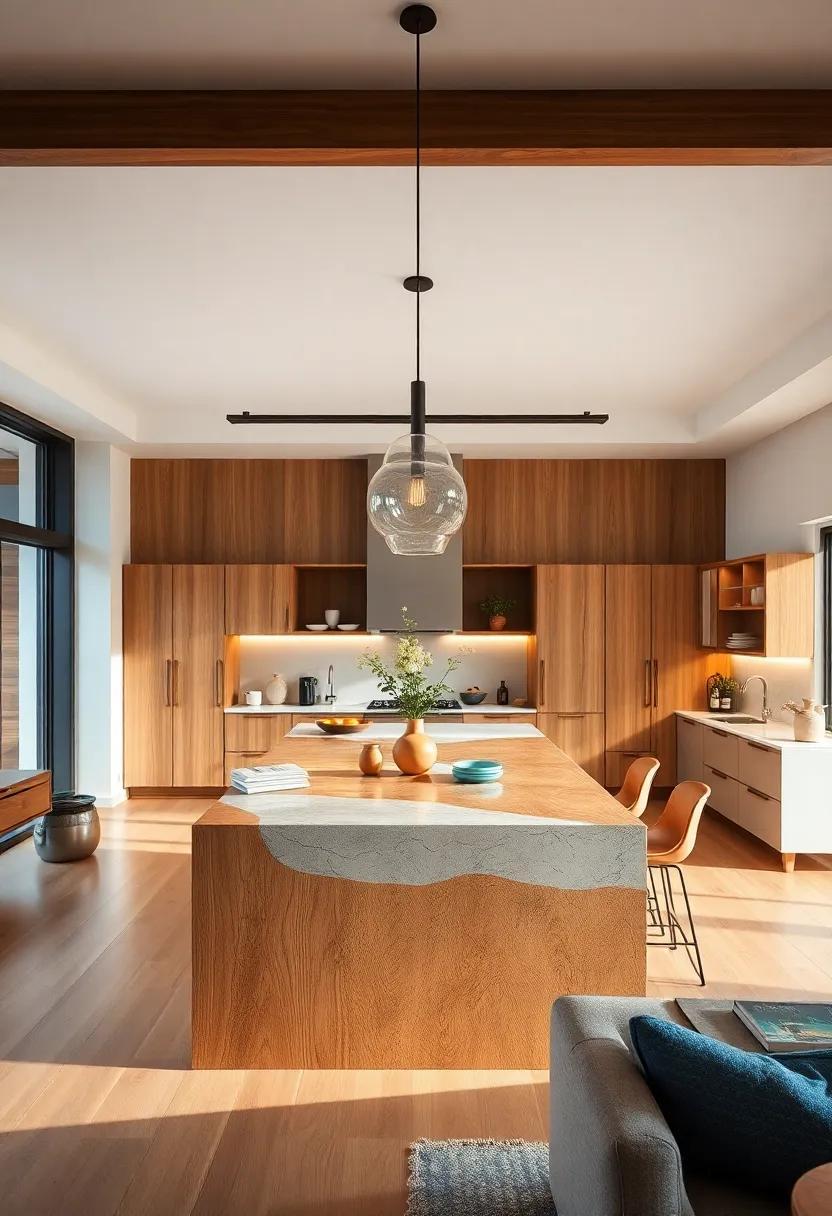
Kitchen islands have evolved into multifunctional powerhouses that blend practicality with aesthetic charm. These central hubs not only provide additional workspace but also serve as an inviting spot for family gatherings and casual meals. Imagine an island that doubles as a breakfast bar, a culinary prep zone, and an entertaining space all in one. This versatility brings forth a range of benefits:
- Social Interaction: The design encourages conversations during cooking or meal prep.
- Increased Storage: Additional cabinets and drawers offer clever organization solutions.
- Stylish Design: A well-designed island acts as a focal point, enhancing the kitchen’s overall aesthetic.
When selecting a kitchen island, consider the variety of materials and features available to suit your style and needs.From stunning granite tops to sleek wooden finishes, the surface can transform your kitchen into a culinary oasis. Moreover, integrating appliances like wine coolers or dishwashers can subtly enhance functionality without compromising elegance. Below is a fast comparison of popular kitchen island materials:
| Material | Pros | Cons |
|---|---|---|
| Granite | Durable, heat resistant | Can be expensive, requires sealing |
| Butcher Block | Warm aesthetic, easily repairable | Needs regular oiling, susceptible to scratches |
| Quartz | Non-porous, low maintenance | Limited heat resistance |
Stylish Storage Solutions That Blend with Open Designs
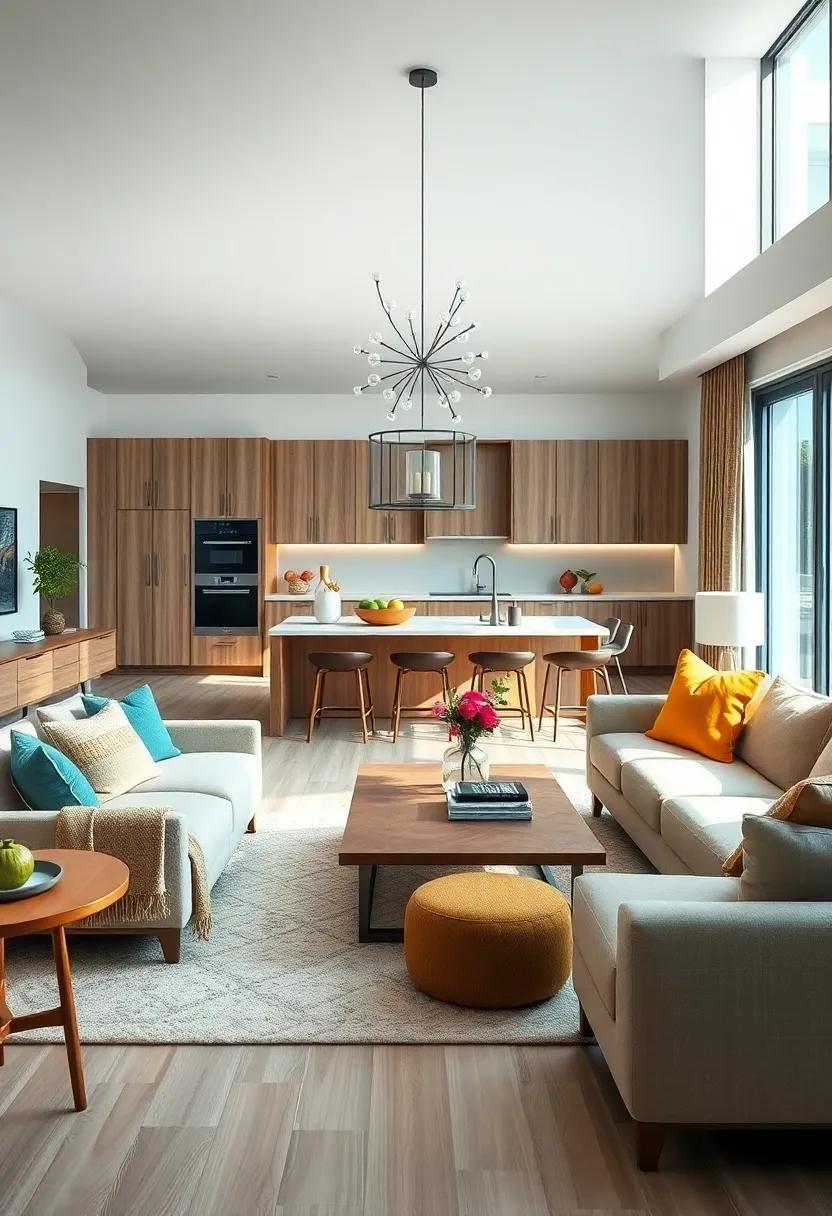
In an open living space,the challenge lies in finding stylish storage solutions that harmoniously coexist with the overall aesthetics. Floating shelves have surged in popularity,providing a sleek way to display books,decor,or even plants without encroaching on valuable floor space. Additionally,multi-functional furniture doubles as both storage and seating; think ottomans with hidden compartments or coffee tables with drawers. These smart choices help maintain an uncluttered look while keeping essentials within easy reach.
For a more polished appearance, cabinetry that blends seamlessly with the kitchen or living room design can elevate the space. Options like built-in benches offer seating while including drawers for stowing away board games or cozy blankets. Another great approach is incorporating decorative baskets or storage bins within easy reach, making them accessible while maintaining visual consistency. Below is a simple table showcasing some popular stylish storage ideas:
| storage Type | Design Benefits | Functionality |
|---|---|---|
| Floating Shelves | Creates the illusion of space | Perfect for displaying accents |
| Ottomans with Storage | Stylish seating option | Hidden storage for clutter |
| built-in Benches | Seamless integration | Seating and storage all-in-one |
| Decorative Baskets | Enhances aesthetics | Organizes items discreetly |
Incorporating Personal Touches in Shared Spaces
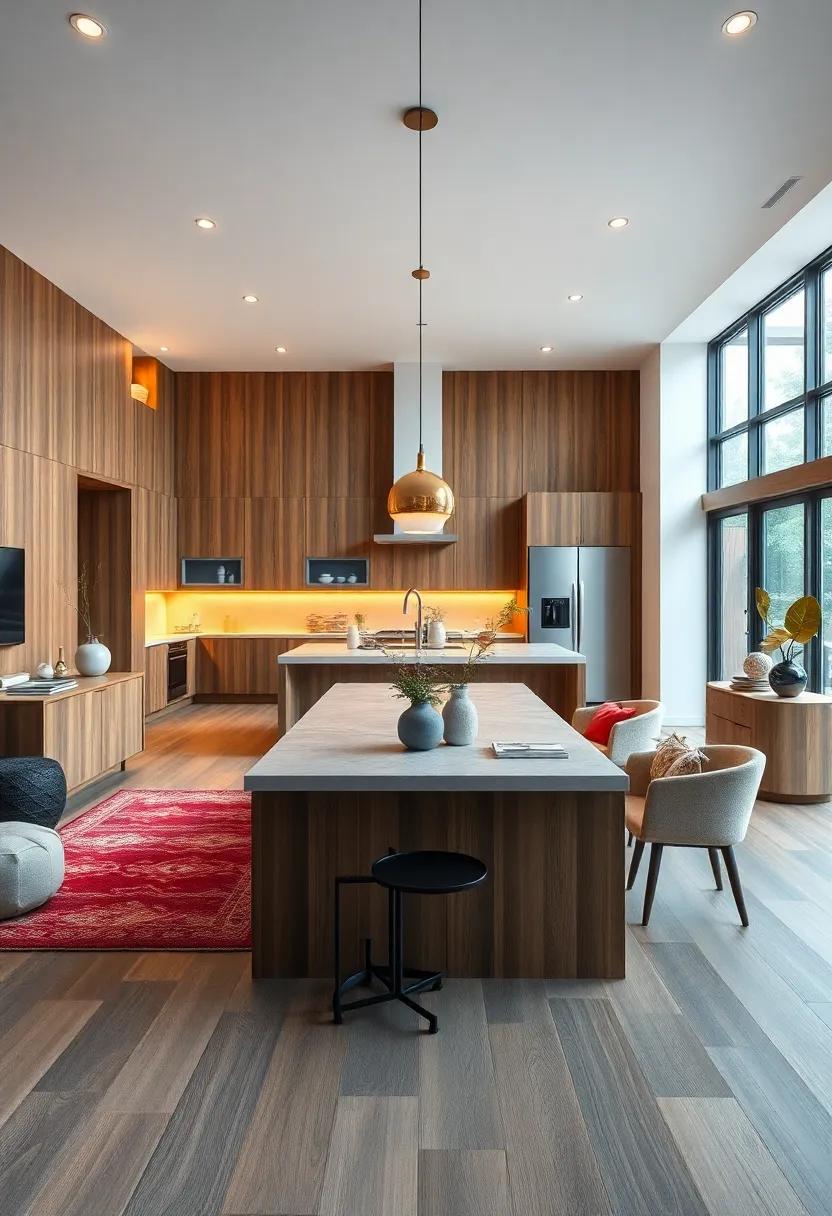
Creating a sense of warmth and individuality in shared spaces can transform the atmosphere of your open-concept living room and kitchen. By incorporating personal touches, you invite a blend of style and comfort that reflects your personality. Consider adding:
- Artistic Displays: Showcase favorite artwork or family photos on floating shelves, making the space not only functional but visually engaging.
- Textured Fabrics: Use a mix of cushions and throws in vibrant colors and different materials to create an inviting and cozy vibe.
- Unique decor Items: Integrate items collected from travels or gifts from loved ones, serving as conversation starters while adding layers of meaning.
Another effective way to personalize your shared space is through the use of plants and greenery. Indoor plants can breathe life into your living area, enhancing both its aesthetic and air quality. Consider the following:
| Plant Type | Light Preference | Maintenance Level |
|---|---|---|
| Peace Lily | Low Light | Low |
| Snake Plant | Indirect Light | Very Low |
| Fiddle Leaf Fig | Bright, indirect Light | Medium |
By thoughtfully curating these elements, you transform your open spaces into a showcase of who you are, promoting a sense of community and belonging while also celebrating individual tastes.
Balancing Aesthetics and Functionality in Open Concepts
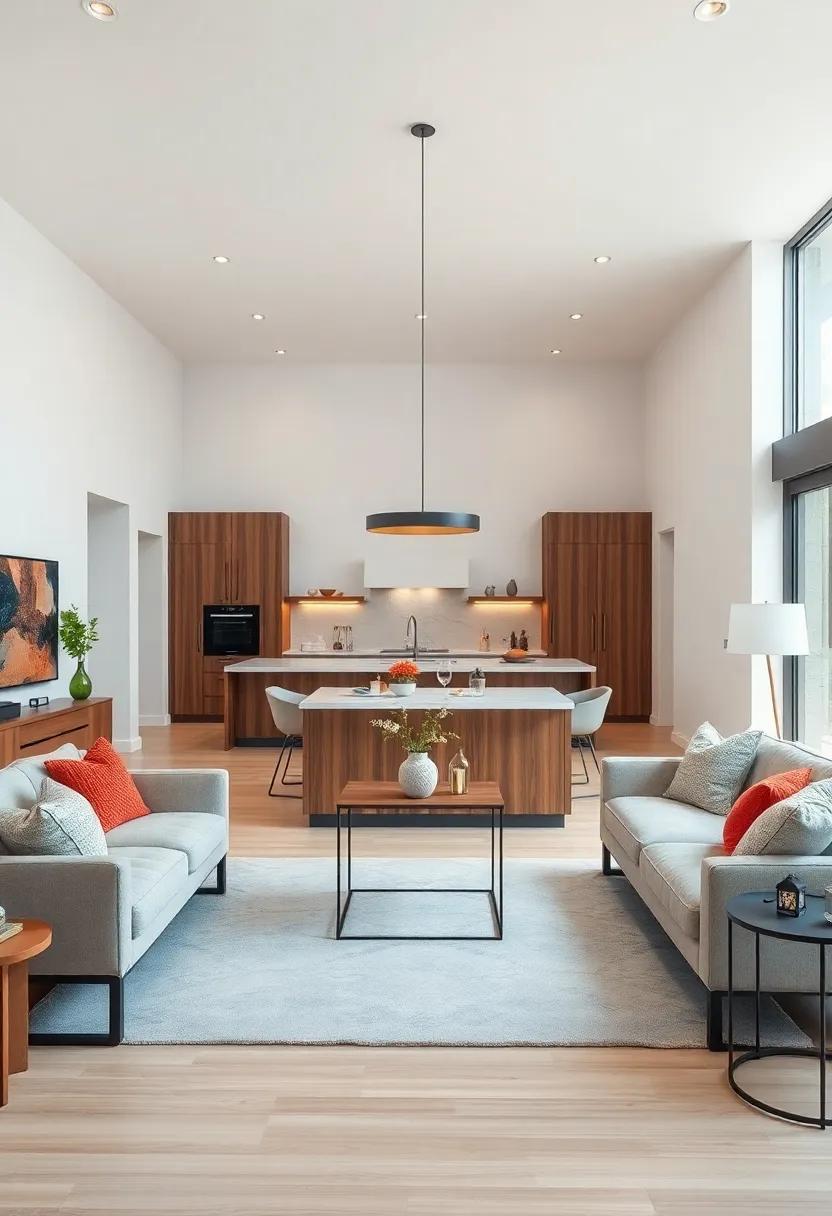
Creating a harmonious living space that marries aesthetics with functionality requires a delicate touch, especially in an open concept design where the kitchen and living areas coalesce. Strategically placed islands can serve multiple purposes beyond being mere cooking surfaces. They can act as transitional furniture, delineating space between the kitchen and living room while fostering a seamless flow.Consider the following elements for optimizing aesthetics:
- Materials Matter: Use complementary materials such as wood,stone,and metals to unify the two areas.
- Color Schemes: Stick to a cohesive color palette that enhances both the kitchen and living room, ensuring visual continuity.
- Lighting: Incorporate pendant lights over the island to offer both task lighting and decorative charm.
However, achieving an inviting atmosphere also requires practical considerations. the island should facilitate the daily rituals of cooking, entertaining, and relaxing, evolving into a central hub for social interaction. Key functionalities include:
| Function | Description |
|---|---|
| Cooking Zone | Equip with cooktops or warming drawers to streamline meal prep. |
| Seating Area | Incorporate bar stools to encourage casual gatherings. |
| Storage Solutions | Include cabinets or open shelving for easy access to utensils and decor. |
The Role of Textiles in Creating Comfortable Environments
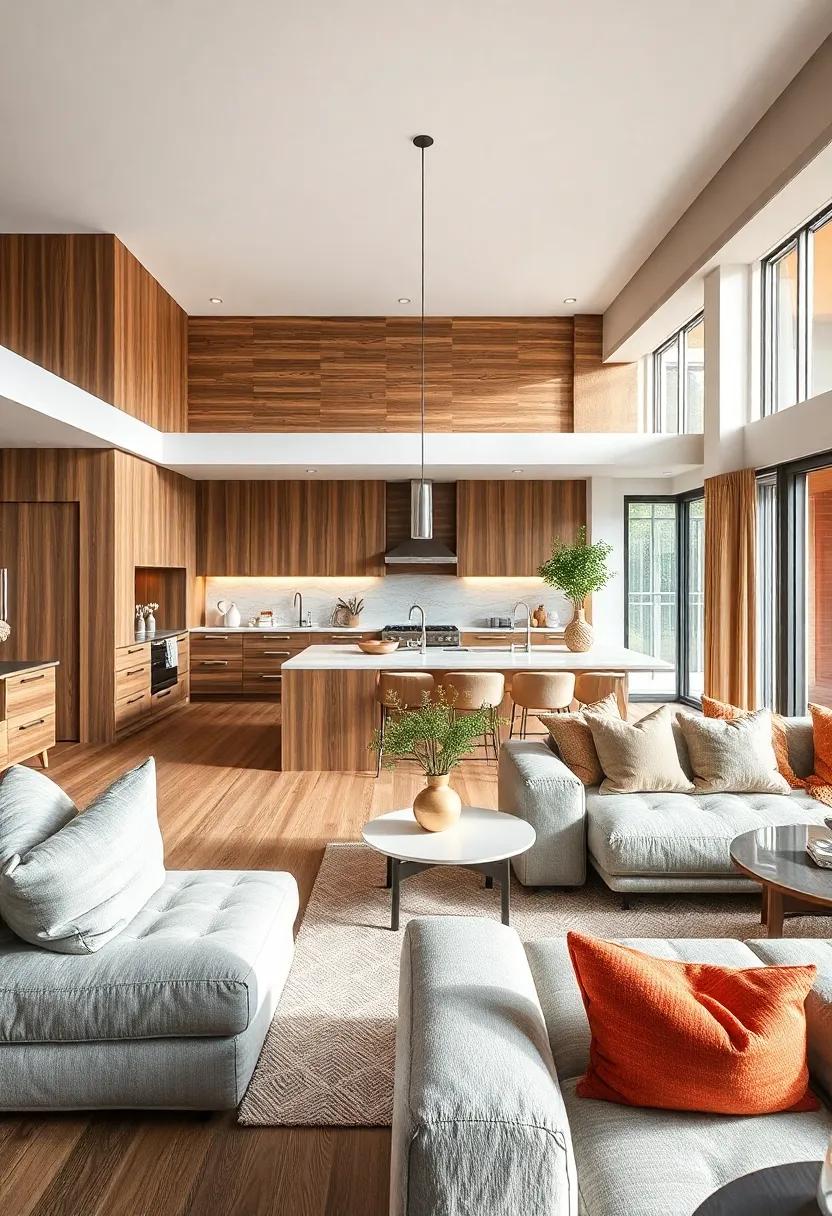
Textiles play a critical role in transforming a living space into a welcoming retreat, especially in an open concept living area. With the right selection of fabrics and materials,one can effectively create layers of comfort that encourage relaxation and togetherness. Consider incorporating these elements:
- Soft furnishings: Plush cushions and throw blankets create cozy nooks, inviting family and friends to gather.
- Rugs: Area rugs demarcate spaces, adding warmth underfoot and enhancing acoustics.
- Window treatments: Light-filtering curtains can soften natural light, contributing to an inviting ambiance.
Moreover, thoughtful choices in textiles can influence the overall aesthetic of the kitchen and living room areas. By harmonizing colors and textures, you can achieve a cohesive look that resonates with the concept of togetherness. For example, a combination of natural linens and soft velvets can create a balance of elegance and comfort. Here’s a simple table outlining recommended fabric types and their characteristics:
| Fabric Type | Characteristics |
|---|---|
| Cotton | breathable, easy to clean, suitable for casual settings. |
| Wool | Warm,durable,adds texture and visual interest. |
| Linen | Natural,lightweight,lends a relaxed feel to interiors. |
| Velvet | Luxurious look,soft touch,enhances comfort in seating. |
Inviting Nature Inside: Greenery in Open Living Spaces
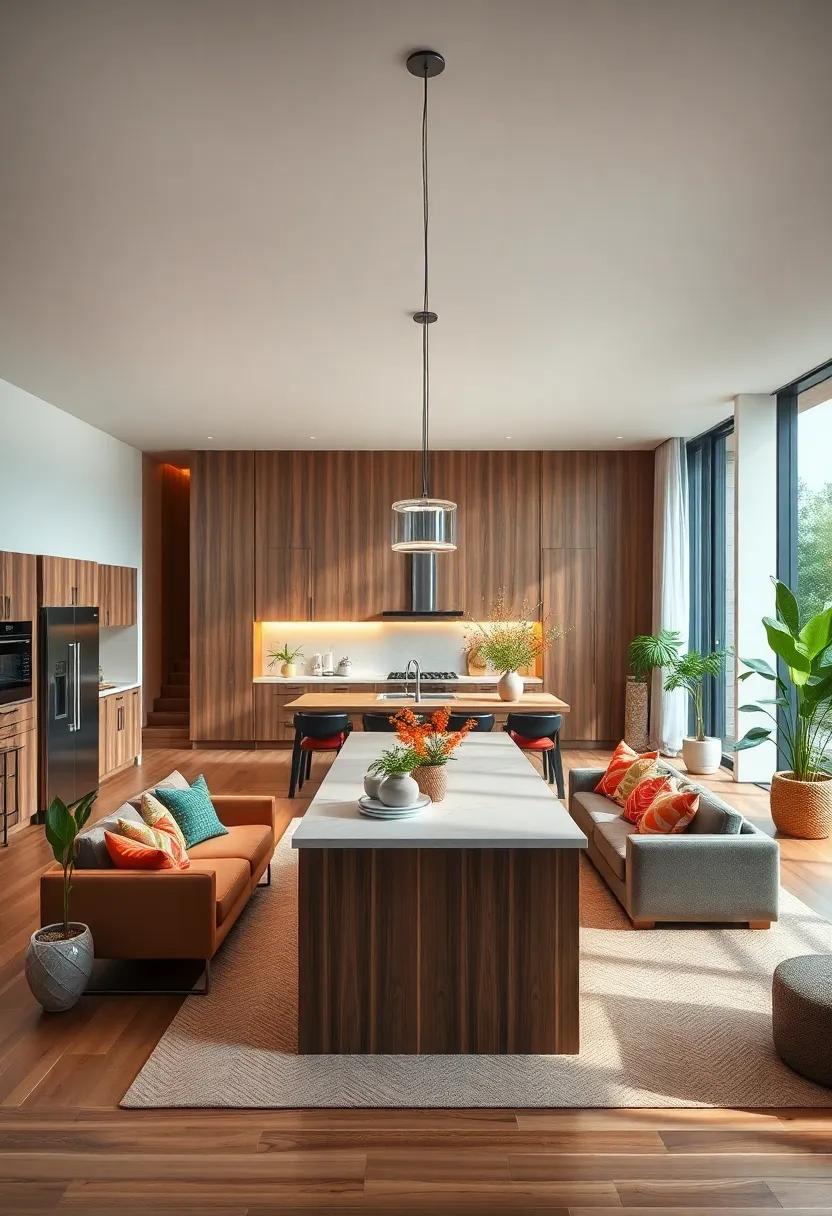
Integrating greenery into open living spaces not only enhances aesthetic appeal but also fosters a sense of calm and connection to nature. Consider the following elements when looking to invite the outdoors into your home:
- Potted Plants: Strategically placed houseplants in various sizes can create layers of green that draw the eye throughout the space.
- Vertical Gardens: Install a living wall to serve as a stunning centerpiece, displaying a range of textures and shades while improving indoor air quality.
- Herb Gardens: A small herb garden on your kitchen island provides fresh ingredients at your fingertips while introducing delightful fragrances to the cooking area.
Choosing the right plants can transform the ambiance of your open living space. When selecting greenery, keep in mind the following factors:
| Plant Type | Light Requirements | care Level |
|---|---|---|
| Snake Plant | Low to Bright | Easy |
| Pothos | Low to Moderate | Easy |
| Peace Lily | Low to Medium | Moderate |
| Fiddle Leaf Fig | Bright Indirect | moderate |
Sensory Experiences: Using sound, Scent, and Light
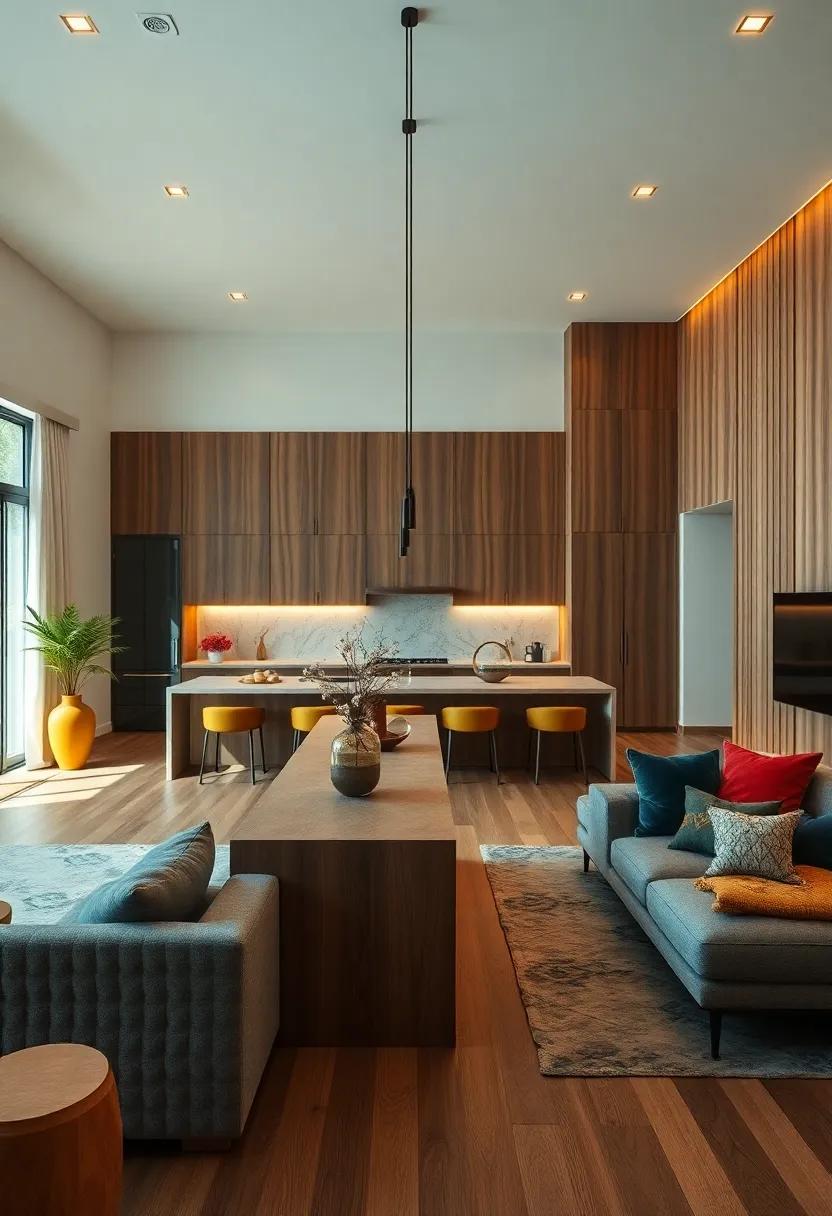
In the heart of a home, where laughter fills the air and notable moments unfold, the harmonious blend of sound, scent, and light plays a pivotal role in enhancing the atmosphere. Imagine soft music wafting through the open space,creating a melody that punctuates the rhythm of conversations held around the kitchen island.The right tunes can infuse vitality into gatherings, while gentle background sounds, like the clinking of glasses or the sizzle of food, weave a rich tapestry of sensory interactions. Additionally, the subtle fragrance from freshly cooked meals dances with the air, inviting loved ones to come together, tantalizing their taste buds before the first bite even takes place.
Illumination further elevates this sensory experience, casting a warm glow that beckons people to linger. By integrating layered lighting—such as recessed lights, decorative fixtures, and task lighting over the island—homeowners can create a versatile ambiance that transitions from cozy family dinners to vibrant celebrations. Utilizing dimmers can adjust the brightness to suit various occasions, enhancing the overall sensory experience. Consider the contrast between soft golden hues during quiet evenings versus brighter lights that energize a lively brunch; each setting tells its own story through light.
Incorporating Technology Seamlessly in Shared Areas
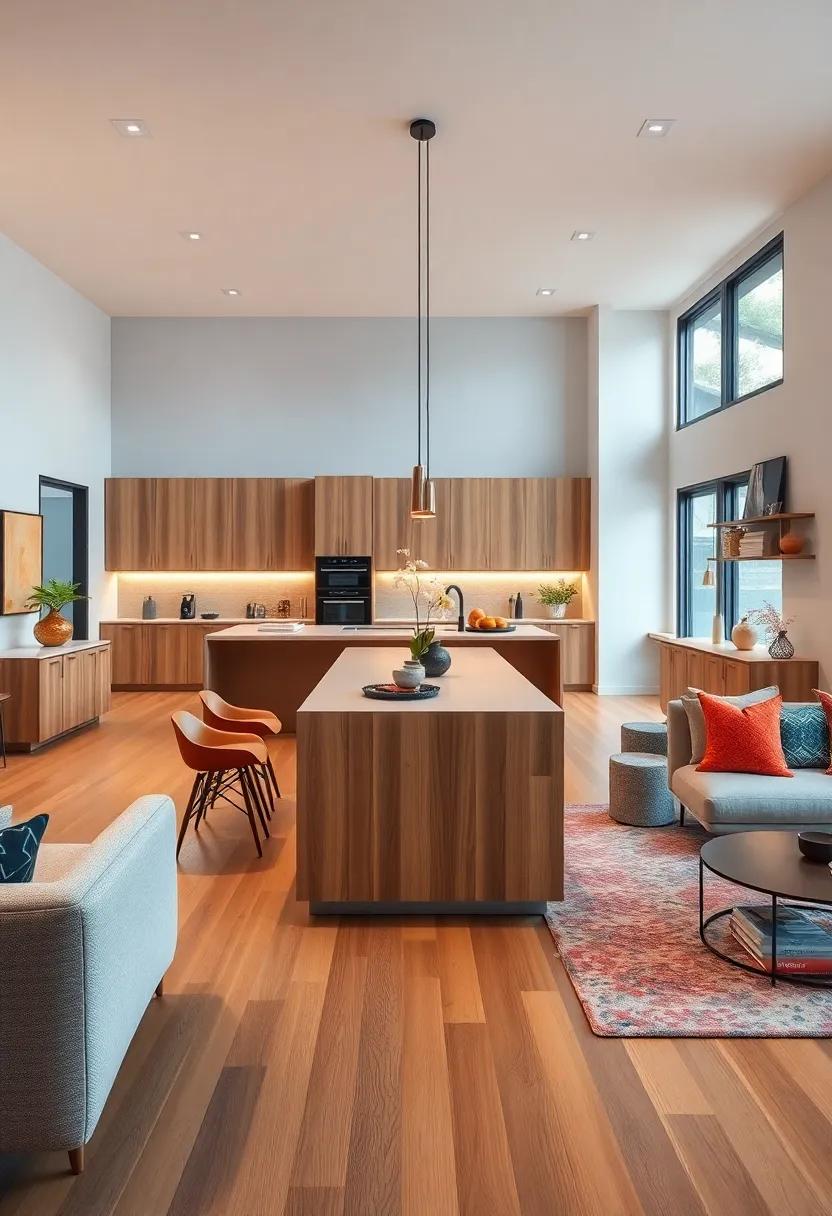
In the heart of modern homes, technology serves as a bridge connecting leisure with functionality in shared spaces. Imagine a living area where you can seamlessly control ambient lighting, adjust sound systems, and display vibrant visuals with a simple voice command or tap on a screen. Integrating smart home devices such as smart speakers, programmable thermostats, and automated shades into this open space not only enhances convenience but also optimizes the overall experience. Think about how these devices can complement the environment, allowing family and friends to gather comfortably while sharing a meal or enjoying entertainment.
Moreover, incorporating technology goes beyond just gadgets; it involves designing furniture that accommodates both traditional and contemporary needs. Kitchen islands equipped with charging stations, built-in tablet holders, and integrated multimedia systems offer an inviting space for cooking and socializing. When planning such spaces, consider:
- Versatile Power Outlets: Ensuring accessibility for all devices.
- Wireless Connectivity: enabling smooth access to the internet without clutter.
- Multifunctional Furniture: Including tables with tech integration for seamless use.
Here’s a simple overview of technology features ideal for open concept living spaces:
| Feature | Description |
|---|---|
| Smart Lighting | Customizable ambience with app or voice control. |
| Integrated Sound systems | Surround sound for music and entertainment. |
| Interactive Screens | Family hub for managing schedules and meals. |
Elevating Atmosphere with the Right Lighting Choices
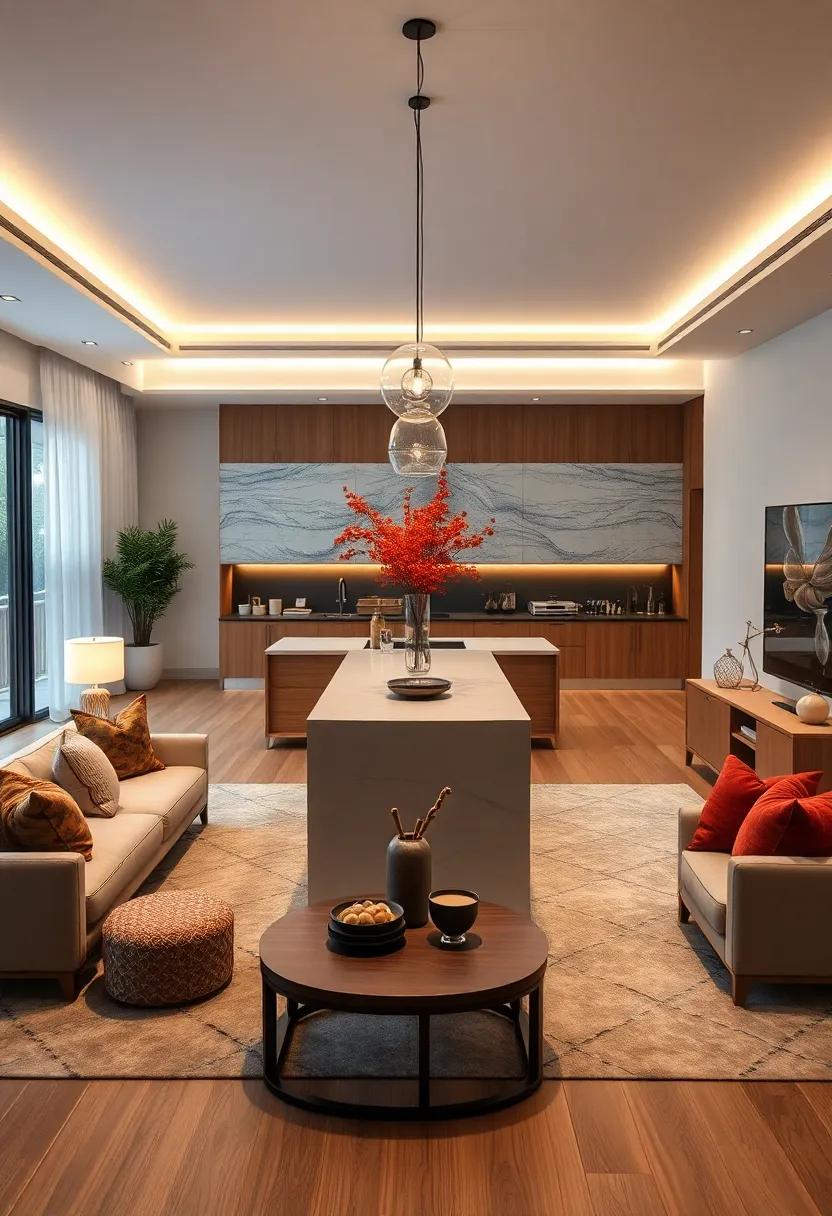
Transforming your living space into a warm and inviting environment can frequently enough hinge on your lighting choices. The right illumination can create an atmosphere that encourages conversation and togetherness, making it essential to consider various types of lighting that suit your open concept living room and kitchen.Here are some key options to consider:
- Accent Lighting: Use wall sconces or table lamps to highlight artwork or architectural features.
- Pendant Lights: Hang stylish pendant lights over the kitchen island to define the space and add visual interest.
- Task Lighting: Ensure workspace areas, such as countertops, are equipped with functional lighting for meal preparation.
- Ambient Lighting: Utilize dimmable ceiling fixtures to create a soft glow, perfect for relaxing evenings.
To further enrich the ensemble, consider the emotional impact of color temperature in your lighting choices. Warmer tones foster intimacy and connection, making communal areas feel cozy and inviting. Meanwhile, cooler shades can provide a crisp, modern edge. Here’s a quick reference of light temperature implications for different spaces:
| Light Temperature | Ideal Space | Effect |
|---|---|---|
| Warm (2700K-3000K) | Living Room, Dining Room | Cozy, Comfortable |
| Neutral (3500K-4000K) | Kitchen, Study | balanced, Invigorating |
| Cool (5000K-6500K) | Bathroom, Garage | Bright, Stimulating |
Creating Distinct Personalities Within an open Layout
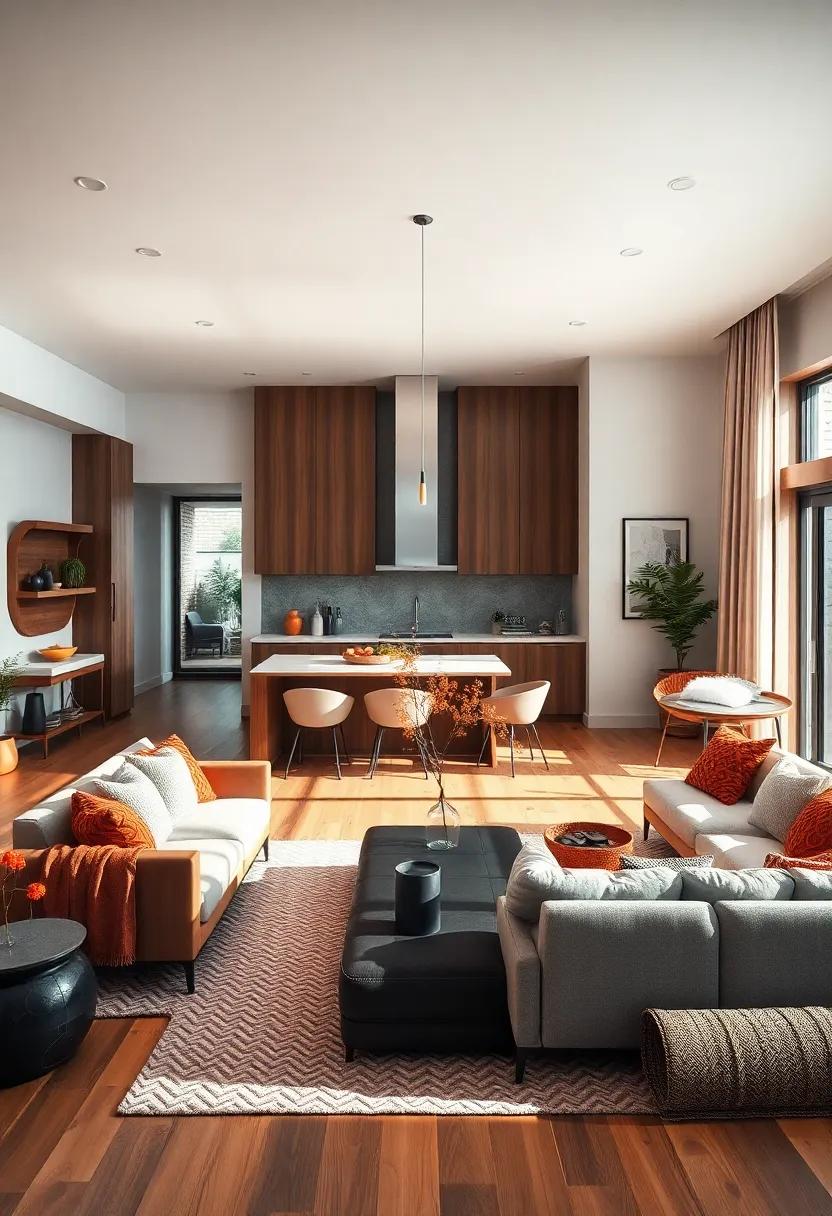
In an open layout, achieving distinctive personalities for different areas can be an imaginative endeavor. Utilize a variety of textures, colors, and materials to define each space while maintaining a sense of harmony. Consider implementing bold color accents in the kitchen area with vibrant cabinetry or backsplash tiles, while opting for earthy tones in the living space to evoke warmth and comfort. Incorporate elements such as rugs, lighting, and artwork to delineate boundaries; as an example:
- Rugs: Use area rugs to anchor seating configurations and define lounge zones.
- Lighting: Choose varied light fixtures, like pendant lights over the island and softer, ambient lighting in the living area.
- Artwork: Select pieces that resonate with each space’s character, enhancing the overall aesthetic without overwhelming it.
In addition to these strategic choices, furniture arrangements play a crucial role in establishing distinct zones within the layout.A bar-height island can serve as an informal eating area or conversation hub, while low-profile sofas and accent chairs invite relaxation in the living space. Explore multifunctional furniture options to increase versatility while minimizing clutter. An ottoman could double as a coffee table or extra seating,contributing both utility and a unique flair. The following table summarizes effective strategies for crafting individual identities within an open layout:
| Area | Personality Element |
|---|---|
| Kitchen | Colorful backsplash,sleek countertops |
| Living Area | Cozy textiles,warm lighting |
| Dining Space | Elegant table settings,statement centerpieces |
The Emotional Impact of Shared Spaces on Relationships
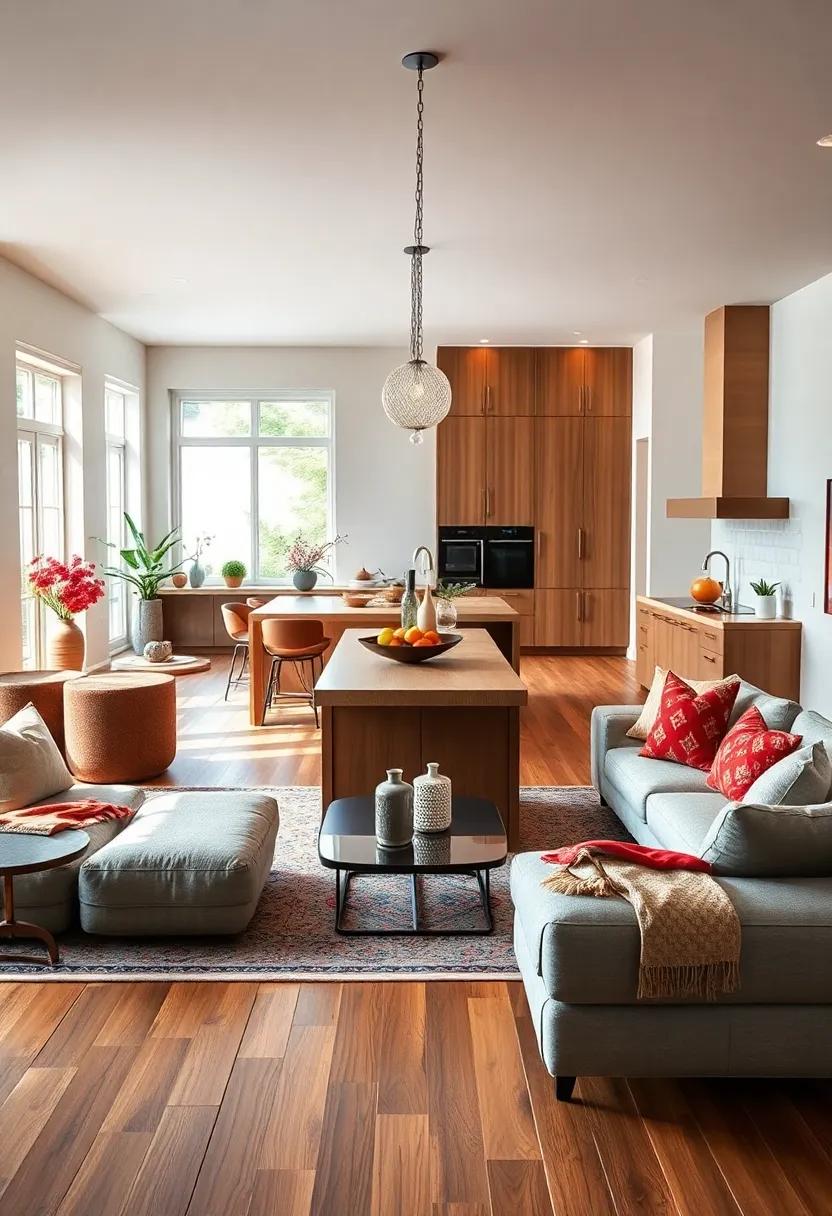
Within the open concept spaces of modern living, the emotional landscape of relationships can flourish in unexpected ways.When couples, families, or friends share a living room that smoothly integrates with the kitchen, the barriers that often separate activities begin to dissolve. cooking together, for instance, transforms mundane tasks into opportunities for connection, fostering communication and shared laughter. The gentle aromas of a simmering pot or the rhythmic chopping of vegetables create a symphony of sensory experiences that deepen emotional bonds. As conversations flow freely, each shared moment nurtures a sense of unity and belonging, making the home a sanctuary of togetherness.
Moreover, the layout encourages social interactions that extend beyond meal prep. It invites spontaneous gatherings, whether for a casual coffee, a game night, or an impromptu dance party. when exploring the dynamics of these open spaces, consider the following benefits:
- Increased Interaction: The layout promotes frequent, informal conversations.
- Enhanced Collaboration: Joint activities,such as cooking or decorating,strengthen teamwork.
- Shared Experiences: Moments created together foster lasting memories.
| Emotional Benefits | Examples |
|---|---|
| Improved Communication | Engaging in conversations over shared tasks |
| Strengthened Bonds | Cooking meals for family or friends |
| Increased Comfort | Casual hangouts in a cozy environment |
Sustainable Choices for Eco-Friendly Open Concept Living
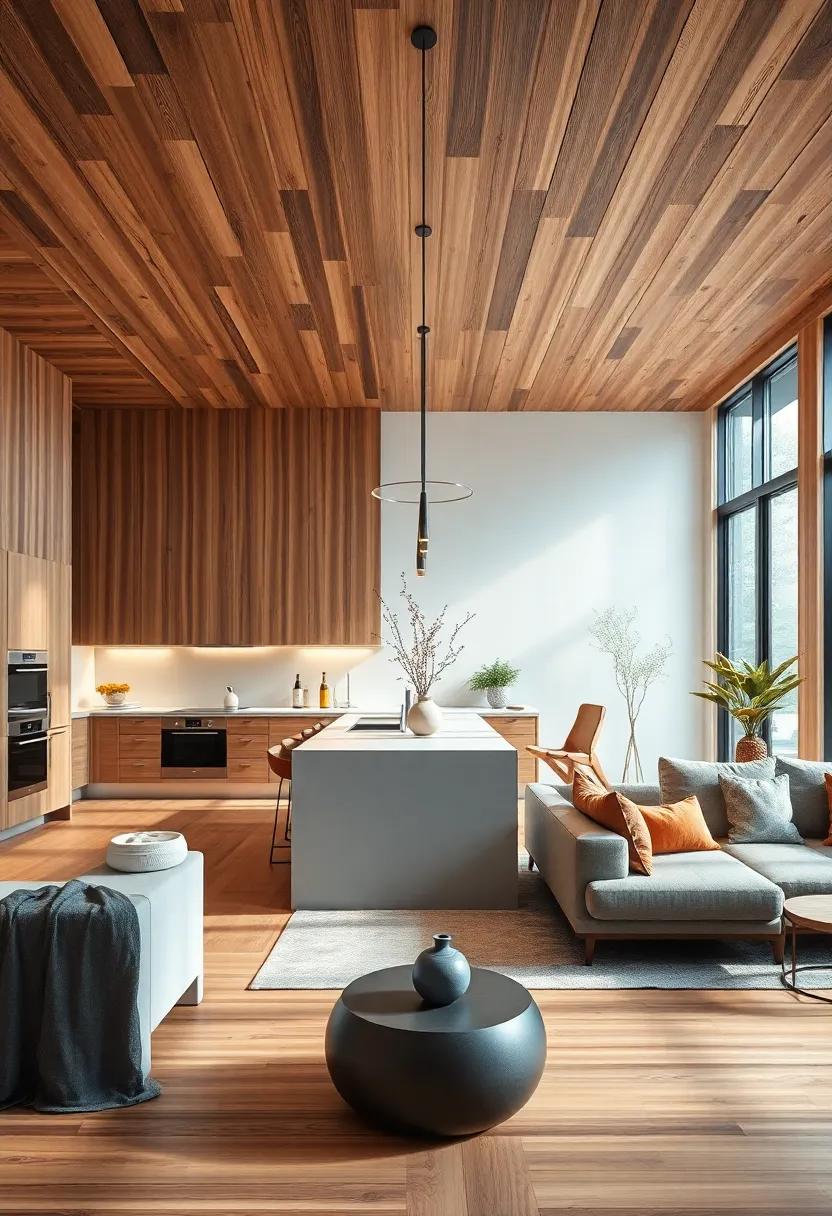
Choosing an eco-friendly lifestyle is not only beneficial for the planet but can significantly enhance the charm of open concept living spaces.When selecting materials for your kitchen island and living areas, consider sustainable options such as reclaimed wood, bamboo, or recycled metal. These materials not only reduce waste but also add a unique character to your space. Additionally, opting for low-VOC (volatile organic compounds) paints and finishes can improve indoor air quality while preserving the environment. To further enhance your commitment to sustainability, look for energy-efficient appliances to incorporate into your design, ensuring that they align with your aesthetic while reducing energy consumption.
Integrating greenery into your open concept design can create a refreshing atmosphere and purify the air. Here are some delightful plant options to include in your space:
- Pothos: Low maintenance and thrives in indirect light.
- Snake Plant: Excellent air purifier and requires minimal watering.
- Fiddle Leaf Fig: Adds a dramatic touch with its large leaves.
To accentuate your eco-friendly choices, consider creating an indoor herb garden within your kitchen island. Not only will this promote sustainable sourcing of fresh produce, but it will also add a dash of greenery and fragrance to the cooking experience. Below is a simple table showcasing herbs that thrive indoors:
| Herb | Light Requirements | Growth Height |
|---|---|---|
| Basil | Bright, indirect light | 12-24 inches |
| Parsley | Partial sun | 6-12 inches |
| Mint | Moderate light | 12-24 inches |
A Culinary Theatre: The Kitchen Island as a social Stage
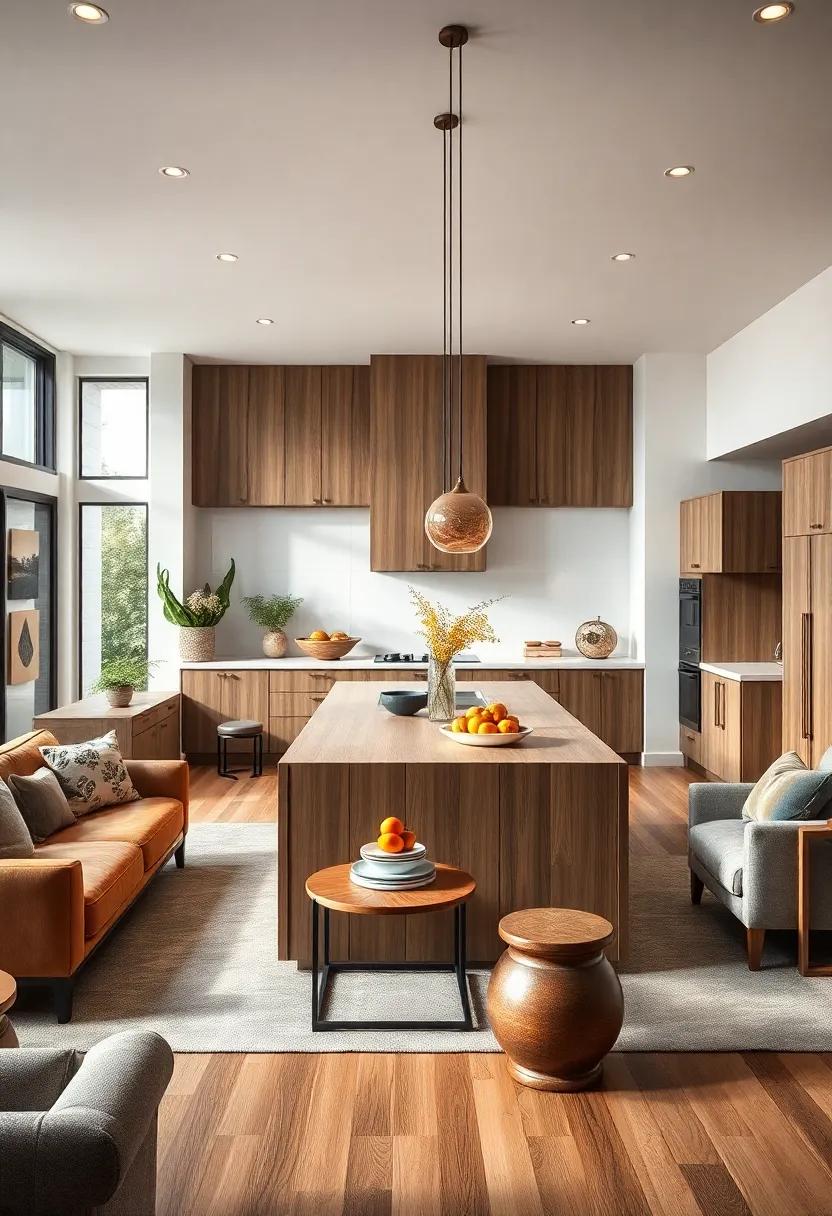
The kitchen island transcends its primary role as a mere culinary workspace, transforming into a social hub where experiences unfold and connections are forged. It becomes a vibrant stage for friends and family to gather,share stories,and create lasting memories. Here, the act of cooking morphs into entertainment, as individuals engage in lively conversations while chopping vegetables, stirring pots, or mixing drinks.The proximity of the dining and cooking spaces blurs traditional boundaries, seamlessly blending preparation with social interaction. This harmonious integration nurtures a sense of community, allowing guests to witness the culinary artistry in action, thus turning everyday meals into performances full of flair and passion.
Moreover, the allure of gathering around the kitchen island cultivates an informal atmosphere, encouraging participation and collaboration. Whether it’s preparing a feast for a holiday celebration or a casual weeknight dinner, the kitchen island provides an interactive setting that embraces spontaneity. Here are some ways this communal space enhances togetherness:
- Shared Experience: Cooking becomes a shared activity rather than a solitary chore.
- Open Communication: Open layouts facilitate easy conversation and engagement.
- Culinary Showmanship: Chefs can showcase their skills while entertaining guests.
- Family Traditions: Rituals of cooking and dining together strengthen bonds.
building Community: How Open Concepts foster Togetherness
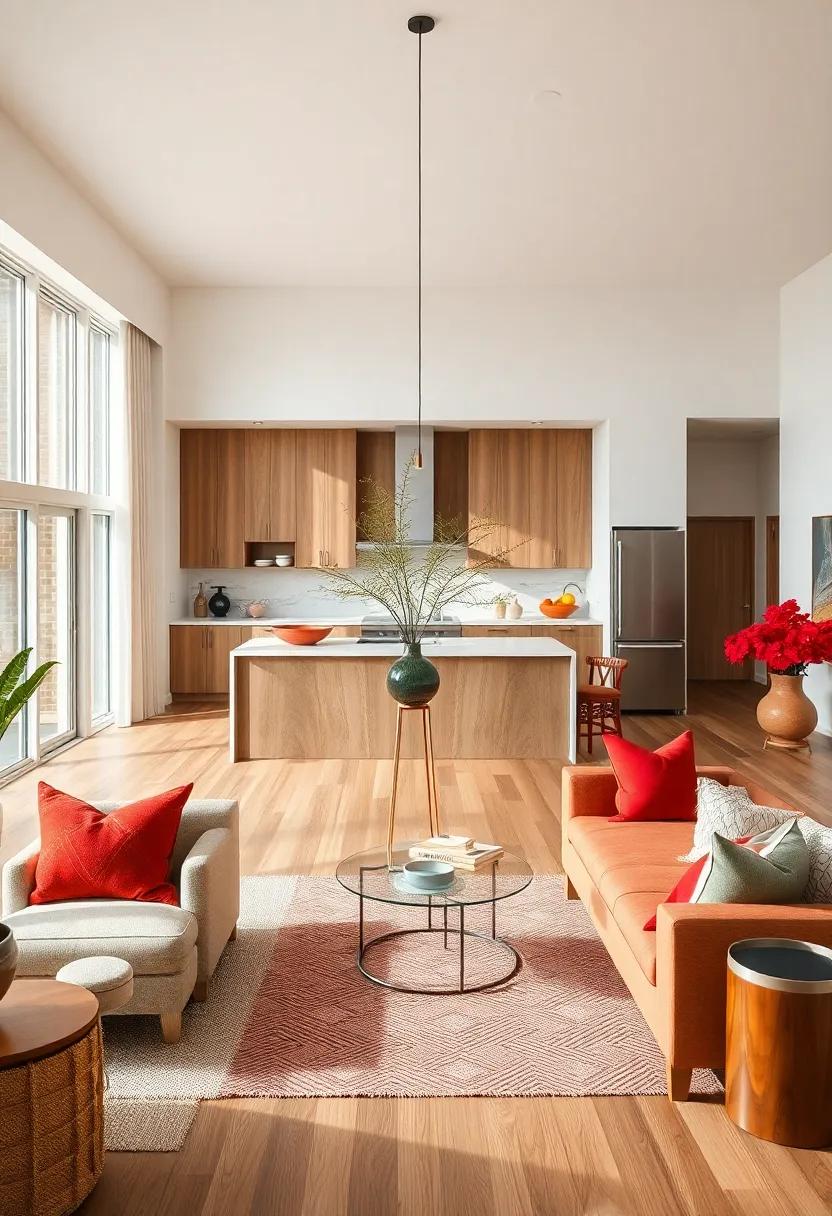
In the heart of modern homes, the open concept living room and kitchen serve as vibrant hubs that foster social interaction and create a sense of togetherness. These spaces dissolve the barriers between cooking and gathering, allowing family and friends to engage in conversation and share experiences seamlessly. With the inviting layout of kitchen islands, the home transforms into a canvas for communal activities, from casual family meals to lively gatherings. This design choice encourages a natural flow, enticing individuals to gravitate towards the warmth and vibrancy that an open space cultivates.
Moreover, the aesthetic appeal of open concepts transcends mere functionality.The large, unbroken sightlines and cohesive design elements promote a feeling of belonging that extends beyond individual family units. Consider the following elements that contribute to the allure of open living arrangements:
- Enhanced Communication: With fewer walls, conversations can happen effortlessly.
- Shared Experiences: Cooking, eating, and relaxing can blend into one enjoyable occasion.
- Flexibility: Furniture arrangements can easily be adapted for various gatherings.
| Feature | Benefit |
|---|---|
| Natural Light | Creates a warm and inviting atmosphere. |
| Spatial Awareness | Improves interaction and connectivity among users. |
| Design Cohesion | Ensures a stylish and modern aesthetic. |
Celebrating Cultural Diversity Through Design Elements
In the realm of interior design, the fusion of various cultural influences can transform an ordinary space into a vibrant tapestry of life. Open concept living areas, especially those incorporating kitchen islands, provide a unique platform to showcase rich design elements that highlight the beauty of cultural diversity. By integrating materials, color palettes, and patterns from around the globe, homeowners can create spaces that not only serve functional purposes but also tell stories of heritage and tradition. Consider incorporating elements such as handcrafted ceramics, woven textiles, or artisanal woodwork, each piece resonating with the echoes of different cultures, thus crafting a narrative that invites guests to explore and connect.
Moreover, the layout of these open spaces encourages interaction and community, reminiscent of communal traditions found in many cultures. A well-placed kitchen island acts as a central hub for gatherings, where the act of cooking and sharing meals becomes a celebration of different culinary arts. This blending of styles can be illustrated through a simple table showcasing transformative design ideas:
| Design Element | Cultural Influence | Purpose |
|---|---|---|
| Colorful Moroccan tiles | Moroccan | Add vibrant aesthetics |
| scandinavian minimalist woodwork | Scandinavian | Provide sleek functionality |
| Mexican woven rugs | Mexican | Create warmth and texture |
In essence, celebrating cultural diversity through thoughtful design elements not only enriches our living spaces but also fosters deeper connections with those we invite into our homes.Each unique choice contributes to an atmosphere of inclusivity and togetherness, turning living room-kitchen combinations into lively celebrations of our shared human experience.
The Trend Towards Minimalism in Open concept Living
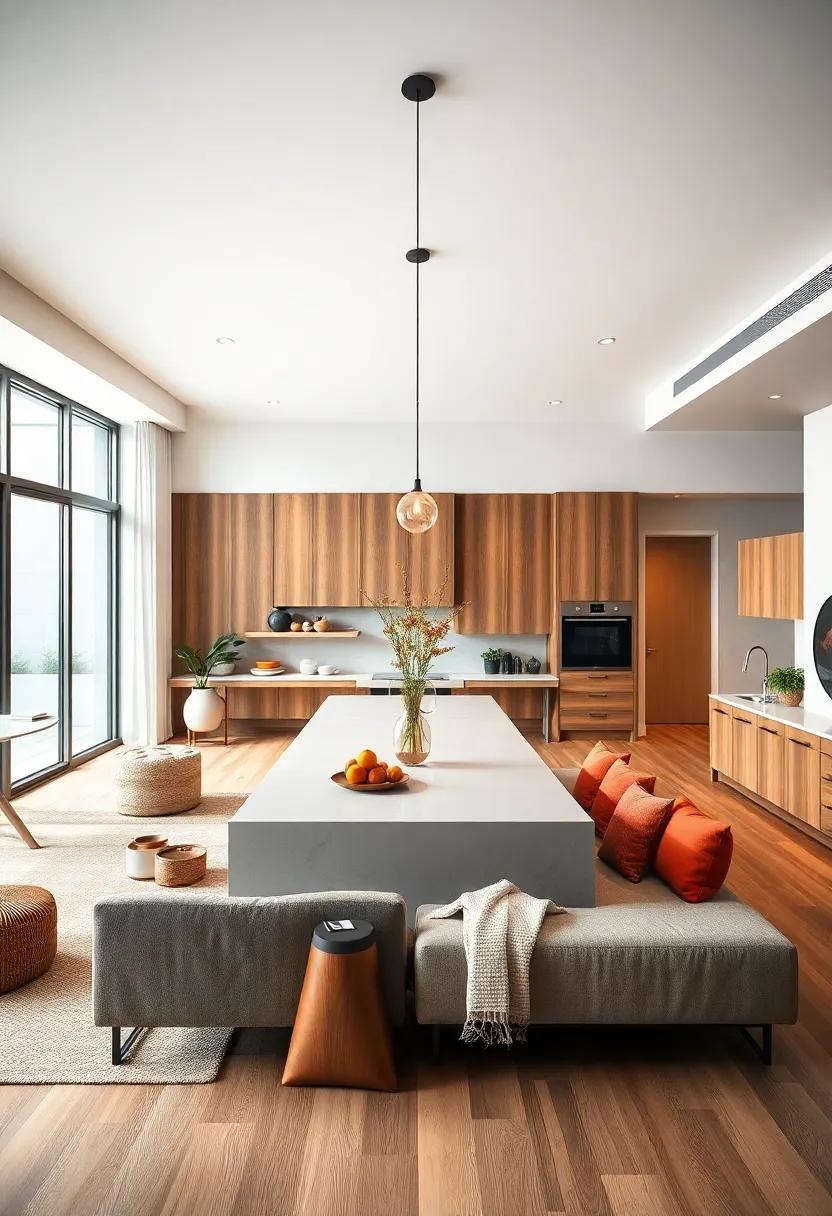
The rise in popularity of minimalism reflects a cultural shift towards simplicity and functionality, blending seamlessly with open concept living spaces. This approach encourages the use of fewer,but more meaningful,elements,creating environments that evoke tranquility and focus. In a home featuring an open layout, the living room and kitchen become interconnected realms, facilitating more interaction and fostering relationships. Essential to this trend are some key elements:
- Neutral Color Schemes: Soft hues create a cohesive visual flow, enhancing the feeling of spaciousness.
- Streamlined Furniture: Choosing multifunctional furniture,such as storage ottomans and sleek coffee tables,maximizes usability.
- Natural Light: Large windows and unobstructed views elevate the ambiance, emphasizing the minimalistic design.
Moreover, the use of kitchen islands as the focal point of an open living space further encapsulates this minimalist vibe. These islands serve not only as a functional workspace but also as a gathering spot, bridging comfort and utility. Their design frequently enough incorporates simple materials and clean lines, allowing them to maintain elegance without overwhelming the space. Below is a comparison of popular island styles that align with minimalistic aesthetics:
| Island Style | Key Features |
|---|---|
| Modern | Geometric shapes, quartz countertops, open shelving |
| Rustic | Reclaimed wood, farmhouse sinks, vintage accents |
| Scandinavian | Ash or light oak, simple lines, minimal detailing |
Artful Arrangements: Decor Strategies for Cohesive Spaces
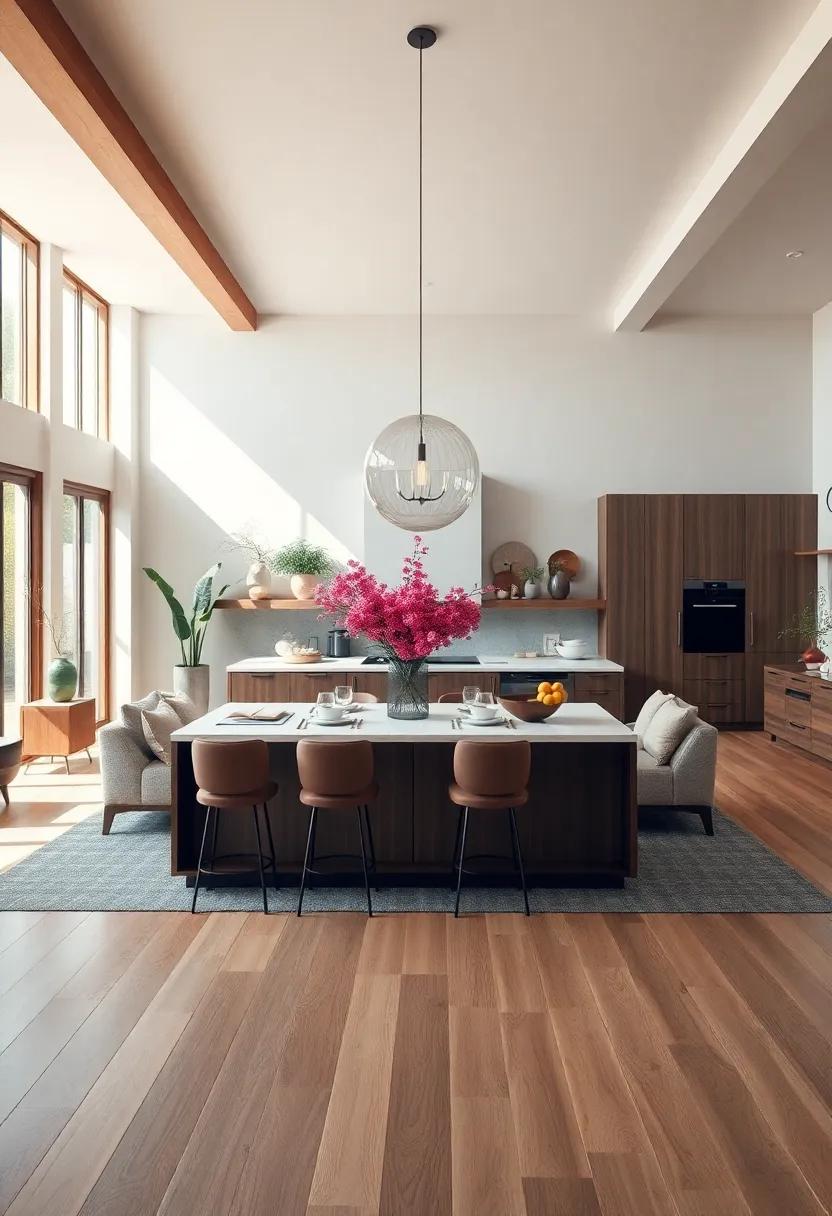
Creating a harmonious environment within an open concept living space requires strategic decoration that emphasizes unity while allowing individual elements to shine. one effective approach is to select a cohesive color palette that flows seamlessly between the kitchen and living areas. For instance, consider using muted earth tones or soft pastels as a base, complemented by vibrant accents that make a statement without overwhelming the senses. Additionally,choosing furniture that mirrors each other in style or material can strengthen the visual connection between spaces. Think of a plush sofa in the living room paired with matching bar stools at the kitchen island, fostering a sense of continuity.
To elevate the aesthetic further, incorporate decorative elements that draw the eye across the space. Layered textures are a great way to achieve this balance – combine soft cushions with sleek metal finishes or wooden tabletops. Using area rugs can also visually delineate zones without walls, anchoring each area while maintaining an open feel.Here are some strategic decor ideas to consider:
- Accent Lighting: Use pendant lights over the kitchen island that mirror or complement fixtures in the living room.
- Art pieces: Hang a series of art pieces that tell a story across both areas, leading the eye naturally from one space to another.
- Plants: Apply greenery to bring life into your open space; consider a tall plant in the corner of the living area that extends the feel of the kitchen.
Final Thoughts
As we draw the curtains on our exploration of open concept living spaces, it’s clear that the allure of combining living room and kitchen islands transcends mere aesthetics. This design choice invites us to embrace togetherness, fostering connections and shared experiences in an ever-evolving space. By blurring the lines between cooking, entertaining, and relaxation, open concept designs create a harmonious environment where family and friends can gather, bond, and create lasting memories.
In a world that sometimes feels fragmented, the open concept serves as a gentle reminder of the importance of community and connection within our homes. Whether you’re hosting a lively dinner party or sharing a quiet moment over morning coffee,these spaces cultivate a sense of belonging that resonates deeply with our core values.
As you contemplate your own living space,consider the potential of an open concept design to enhance not just the flow of your home,but the quality of the relationships within it. Embrace the beauty of togetherness, and let your living space reflect the warmth and unity that defines our most cherished moments. After all, the heart of the home is not just in its layout but in the love and laughter that fill it.
As an Amazon Associate I earn from qualifying purchases.

